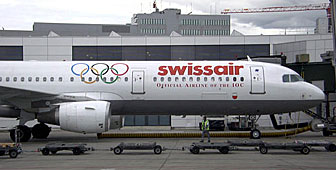Swissair deal dominates business

The long-awaited rescue package for Swissair's airline industry, following the financial collapse of the Swissair Group, dominated the business week in Switzerland.
On Monday, it was announced that both industry and government would come to the rescue by providing a total of SFr4.24 billion ($2.57 billion) to set-up a new national airline.
The new airline will be built from the remains of Swissair, and based on the regional airline, Crossair. Under the rescue deal Crossair will acquire two-thirds of the fleet and destinations of the 70-year old Swissair.
It will operate Swissair’s European destinations from next Monday and long-haul flights from April 2002.
Government stake
The Swiss government, which has already provided SFr450 million at the beginning of the month in order to keep Swissair’s planes flying, will also take a 20 per cent stake in the regional airline, Crossair.
The deal was, however, not without its critics, as airline sector analysts smarted at the use of more than SFr1 billion (about $610,000) in government funds to prop up the ailing Swiss aviation sector.
By Tuesday the European Commission was also ready to voice its concerns over the extent of the government’s support for the new airline.
The government had pledged to play only a minority role in the total rescue package, but ended up paying a sizeable chunk of the total bill, much of it in aid that will never be repaid.
Industry role
Private companies were to contribute around SFr1.7 billion to the capital of the new airline, including SFr350 million already promised by UBS and Credit Suisse, who invested SFr260 million in Crossair earlier this month.
On Thursday it was reported that implications of the government’s heavy involvement in the rescue package would be felt in the state’s finances.
The SFr1.23 billion injected into the Swissair rescue wiped out the planned budget surplus.
The Finance Ministry said in a statement that the costs of keeping Swissair afloat, and aid for its successor airline, based around Crossair, made a shortfall in the government’s finances inevitable.
Altered forecast
Away from Swissair the government agency in charge of economic forecasts cut its estimate for the Swiss economy’s growth on Thursday to 1.6 per cent in 2001 from the 1.8 per cent it foresaw only last month.
The State Secretariat for Economic Affairs (SECO) also reduced its forecast for economic growth in 2002, cutting it back to 1.3 per cent from an original 2.0 per cent.
SECO cited slower global growth, the impact of suicide attacks in the United States, the Swiss airline crisis and the strong Swiss franc as reasons for the revision.
Other corporate news came on Tuesday from Ciba Specialty Chemicals. It saw its net income drop eight per cent after nine months in 2001. The Basel-based firm blamed the drop on a strong Swiss franc and the global economic slowdown.
The chemical specialist’s sales reached SFr5.7 billion ($3.4 billion), down five per cent from the previous year. Net profit was SFr303 million, versus SFr329 million in 2000.
Profits tumble
On Wednesday ABB, the Swiss-Swedish electro-technical concern, saw its net profits drop 76 per cent to $289 million (SFr479 million) in the first nine months of the year, compared with the same period in 2000.
Also on Wednesday, Adecco, the world’s largest temporary employment agency, saw its revenue increase by eight per cent in the first nine months of 2001, reaching SFr20.9 billion ($12.55 billion).
However, revenue declined by four per cent in the third quarter compared with the same period last year.
Meanwhile Syngenta, the Basel-based agrochemical firm, saw its sales drop in the first nine months of the year, compared with the same period in 2000. A weakening global economy and currency fluctuations were blamed for the lower results.
The group said on Thursday that sales through to September were generally five per cent lower, reaching $5.13 billion (SFr8.53), compared with $5.61 billion last year.
by Tom O’Brien

In compliance with the JTI standards
More: SWI swissinfo.ch certified by the Journalism Trust Initiative
You can find an overview of ongoing debates with our journalists here. Please join us!
If you want to start a conversation about a topic raised in this article or want to report factual errors, email us at english@swissinfo.ch.